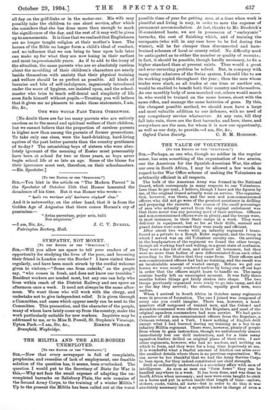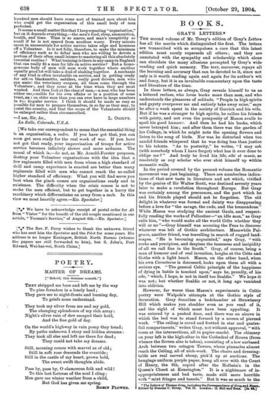SIR,—Perhaps, as one who, though no soldier in the regular
sense, has seen something of the organisation of two armies, one the American for the Spanish-American War, the other our own in South Africa, I may be allowed a few words in regard to the War Office scheme of making the Volunteers so arbitrarily efficient in all respects.
The bulk of the American Army was formed in the National Guard, which corresponds in many respects to our Volunteers. Less than 30 per cent., I believe, though I have not the figures by me, of the original Guard actually went on service. The organisa- tion, however, was there, and the men and non-commissioned officers who did not go were of the greatest assistance in drilling and preparing the recruits. One reason of the small percentage of men who actually served from the original enlistment was that there never was any pressing need of their services. Officers and non-commissioned officers were in plenty, and the troops were, in most instances, in their State camps in a week. They were deficient in equipment, but so far as their drills, manual and guard duties were concerned they were ready and efficient.
After about two weeks with an infantry regiment I trans- ferred as a private to a Rough Rider regiment, and the troop in which I served was an old Volunteer cavalry one. On arriving at the headquarters of the regiment we found the other troops, though all working hard and willing, in a great state of confusion. They were a fine lot of men, and almost all horsemen, but they were no more than bodies of men differentiated from each other according to the States that they came from. Their officers and non-commissioned officers had had no training, and the result was an incalculable amount of wasted energy. Before we got our horses we were nearly rendered useless by being run off our legs in order that the officers might learn to handle us. The camp routine hardly left an unoccupied moment. It was fully three months before things got fairly shaken into shape. The two troops previously organised were ready to go into camp, and did so the day they arrived ; the others, equally good men, were useless.
When 1 arrived in South Africa in October many regiments were in process of formation. The one I joined was composed of every one you could imagine. There was, however, a head- quarters staff composed of trained men, and the Colonel and second-in-command were officers in the Regulars, and most of the original squadron commanders had seen service. We had quite a number of old non-commissioned officers from the Regulars, a Crimean veteran, and a Turk. I knew nothing of English drill except what I had learned during my training as a boy in an infantry Militia regiment. There were, however, plenty of people from whom to gain instruction, though we unfortunately almost immediately lost onr drill instructors, and for a time many squadron leaders drilled on original plans of their own. I saw other regiments, however, who had no nucleus, and nothing on which to form, and they were for a long time hopelessly at sea. It is wonderful what a fearful amount of friction can arise over the smallest details where there is no previous organisation. We can never be too thankful that we had the Army Service Corps to lean upon, for they indeed constituted our chief strength.
Drill as ordinarily understood is a secondary affair with men of intelligence. As soon as men can "form fours" they can be handled anywhere in a week. It has been done, and was done in South Africa when necessary ; and men were even taught to stick on a horse and put in action inside that length of time—sailors, stokers, cooks, valets, all sorts—but in order to do this it was absolutely necessary that a squadron leader in charge of even a
hundred men should have some sort of trained men about him who could get the organisation of this small body of men perfected.
It seems a small matter this that I keep repeating "organisation," but on it depends everything,—the men's food, sleep, ammunition, health, and time. Time is so scarce, and man's receptivity so small if he is not spared from needless worry. Every minute spent in unessentials for active service takes edge and keenness off a Volunteer. Is it not folly, therefore, to make the minimum of efficiency such as to debar men who are willing to devote a portion of their often small leisure to mastering all this absolutely essential routine ? What training is there in any camp in England that can really fit a man for life on active service ? But a homo- geneous body of men will soon work together where another equally good lot will take a deal of shaking together. A mechanic of any kind is often invaluable on service, and in getting ready for action blacksmiths, saddlers, really good drivers, men who can assist the veterinary surgeon, all these come through the Volunteer;, and they come at the time when they are most wanted. And then look at the class of man,—a man who has been either res,mnsible for his own affairs or in a position of some trust, an l an older man than you can over have in largo numbers in the liegular service. I think it should be made as easy as possible for men to prepare themselves, in so far as they may, to assist the country, and that the scope of the Volunteers should be enlarged rather than circumscribed.
—I am, Sir, &c., L. OGILVY.
La Salle, Colorado, U.S.A.
[We take our correspondent to mean that the essential thing is an organisation, a cadre. If you have got that, you can soon get men ready for the real work of war. If you have not got that ready, your improvisation of troops for active service becomes infinitely slower and more arduous. The moral of which is,—do not, as Mr. Arnold-Forster proposes, destroy your Volunteer organisations with the idea that a few regiments filled with men from whom a high standard of drill and camp experience is exacted are better than many regiments filled with men who cannot reach the so-called higher standard of efficiency. What you will find serve you best when the pinch comes are organisations ready and in existence. The difficulty when the crisis comes is not to make the men efficient, but to get together in a hurry the machinery which differentiates an army from a mob. In this view we most heartily agree.—ED. Spectator.]



















































 Previous page
Previous page